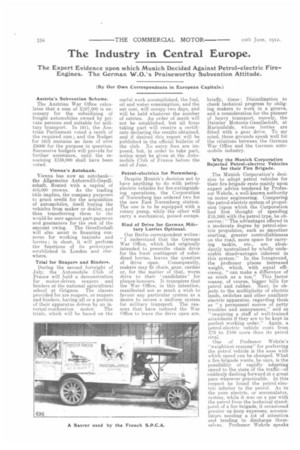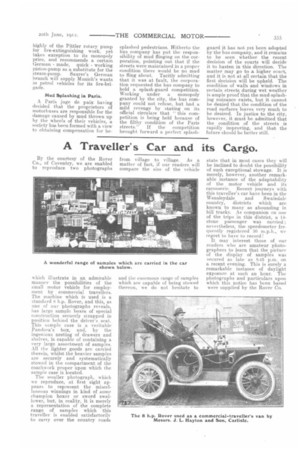The Industry in Central Europe.
Page 8

Page 9

If you've noticed an error in this article please click here to report it so we can fix it.
The Expert Evidence upon which Munich Decided Against Petrol-electric FireEngines. The German W.O.' s Praiseworthy Subvention Attitude.
(By Our Own Correspondents in European Capitals.) Austria's Subvention Scheme.
The Austrian War Office calculates that a sum of -167,000 is necessary for the subsidizing of freight automobiles owned by private persons and suitable for military transport. In 1911, the Austrian Parliament voted a tenth of the required sum ; and the Budget for 1912 contains an item of over £8000 for the purpose in question. Successive budgets will provide for further assistance, until the remaining 1159,000 shall have been voted.
Vienna's Autobank.
Vienna has now an autobankthe Allgemeine Autocredit-Gesellschaft, floated with a capital of 410,000 crowns. As the trading title implies, the company purposes to grant credit for the acquisition of automobiles, itself buying the vehicles from maker or dealer, and then transferring them to the would-be user against part-payment and guarantees for the rest of the amount owing. The Gesellschaft will also assist in financing concerns for working taxicabs and lorries ; in short, it will perform the functions of its prototypes established in London and elsewhere.
Trial for Reapers and Binders.
During the second fortnight of July, the Automobile Club of France will hold a demonstration for motor-driven reapers and binders at the national agricultural school at Grignon. The classes provided for are reapers, or reapers and hinders, having all or a portion of their apparatus driven by an internal-combustion motor. The trials, which will be based on the useful work accomplished, the fuel, oil and water consumption, and the net cost, will occupy two days, and will be held whatever the number of entries. An order of merit will not. be established, but all firms taking part will receive a certificate declaring the results obtained, and if desired this report will be published in the official bulletin of the club, No entry fees are imposed, but, in order to take part, notice must be given at the Automobile Club of France before the end of June.
Petrol-electrics for Nuremberg.
Despite Munich's decision not to have anything to do with petrolelectric vehicles for fire-extinguishing operations, the Corporation of Nuremberg has ordered two for the new East Nuremberg station. The one is to be equipped with a rotary pump, while the other will carry a mechanical, poised escape.
Kind of Drive for German Military Lorries Optional.
Our Berlin correspondent writes : "I understand that the German War Office, which had originally intended to prescribe chain drive for the fresh contingent of subsidized lorries, leaves the question of drive open. Consequently, makers may fit chain, gear, cardan or, for the matter of that, worm drive to their candidates' for plaque-honours. It transpires that the War Office, in this intention, manifested not so much a wish to favour any particular system as a desire to secure a uniform system for military transport. The reasons that have induced the War Office to leave the drive open are, briefly, these : Disinclination to check technical progress by obliging makers to work in a groove, and a consideration for the pioneer of heavy transport, namely, the Daimler Motoren-Gesellschaft, at Marienfelde, whose lorries are fitted with a gear drive. To my mind, these grounds speak well for the relations between the German War Office and the German automobile industry.
Why the Munich Corporation Rejected Petrol-electric Vehicles for their Fire Brigade.
The Munich Corporation's decision to adopt petrol vehicles for their fire-brigade rests mainly upon expert advice tendered by Professor Wehrle, a well-known authority on motor engineering. Comparing the petrol-electric system of propulsion (upon which the Corporation had first thought of spending £19,500) with the petrol type, he observes: "The advantages offered in a moderate degree by petrol-electric propulsion, such as smoother starting, greater controllableness on the road, more space for carrying tackle, etc., are abundantly neutralized by wholly undeniable disadvantages inherent in this system." In the foreground, the professor places increased weight, which, with equal efficiency, "can make a difference of as much as a ton." This factor means, of course, bigger bills for petrol and rubber. Next, he objects to the multiplicity of electric leads, switches and other auxiliary electric apparatus, regarding them as "a permanent source of petty troubles and annoyances," and as 'requiring a staff of well-trained attendants if they are to be kept in perfect working order." Again, a petrol electric vehicle costs from £75 to £100 more than its petrol rival.
One of Professor Wehrle's "weightiest reasons" for preferring the petrol vehicle is the ease with which speed can be changed. What a fire-brigade wants, he says, is the possibility of rapidly adapting speed to the state of the traffic—of suddenly dashing forward at a great pace wherever practicable. In this respect he found the petrol-electric inferior to the petrol. As to the pure electric, or accumulator, system, while it was on a par with the petrol from the technical standpoint of a fire brigade, it occasioned greater up keep expenses, accumulators needing a lot of attention and tending to discharge themselves. Professor Wehrle speaks highly of the Pittler rotary pump for fire-extinguishing work, yet takes exception to its monopoly price, and recommends a certain German made, quick working piston-pump as a substitute for the steam-pump. Saurer's German branch will supply Munich's wants in petrol vehicles for its fire-brigade.
Mud Splashing in Paris.
A Paris juge de paix having decided that the proprietors of motorbuses are responsible for the damage caused by mud thrown up by the wheels of their vehicles, a society has been formed with a view to obtaining compensation for be splashed pedestrians. Hitherto the bus company has put the responsibility of mud flinging on the corporation, pointing out that if the streets were maintained in a proper condition there would be no mud to fling about. Tacitly admitting that it was at fault, the corporation requested the bus company to hold a splash-guard competition. Working under a monopoly granted by the city, the bus company could not refuse, but had a mild revenge by stating on its official circulars that " this competition is being held because of the filthy condition of the Paris streets." If the competition brought forward a perfect splash guard it has not yet been adopted by the bus company, and it remains to be seen whether the recent decision of the courts will decide it to hasten in this direction. The matter may go to a higher court, and it is not at all certain that the first decision will be upheld. The condition of walls and windows in certain streets, during wet weather is ample proof that the mud-splashing nuisance exists, but it cannot be denied that the condition of the road surfaces leaves very much to be desired. In justice to the city, however, it must be admitted that the condition of the streets is rapidly improving, and that the future should be better still.
























